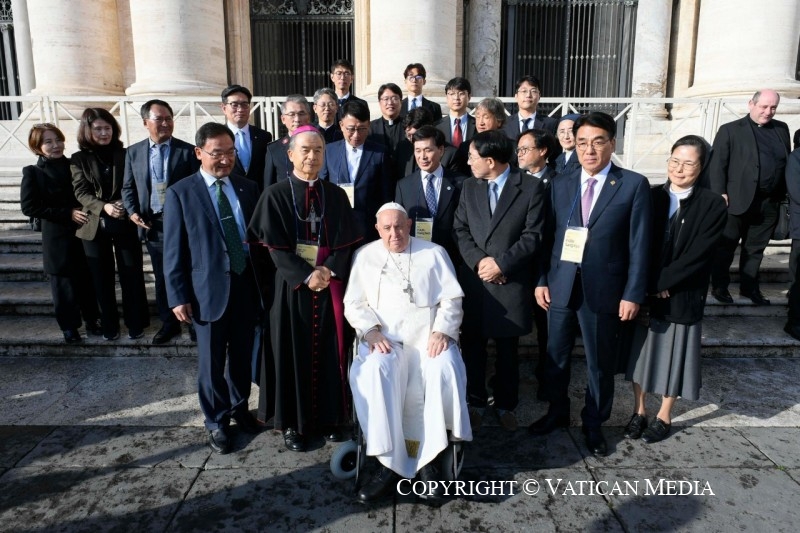Pope: 'The audience also in Chinese'. New gesture towards Chinese Catholics
As of next week, a summary of the catechesis will be presented every Wednesday in St. Peter's Square in the most widely spoken language in the world. The announcement, personally made today by the pontiff, is part of the new climate between the Vatican and China. To the faithful, Francis, mentioned the harsh winter in Ukraine, and appealed for more peacemakers, not wars. In the catechesis on the "fruits of the Spirit", he said that the Gospel must be proclaimed without a long face.
Vatican City (AsiaNews) – This morning, at the Wednesday general audience, Pope Francis announced from St Peter's Square that, “Next week, with Advent, the Chinese translation will also be here in the audience.”
The pontiff expressed this latest show of attention to China’s Catholic communities, part of the climate of collaboration between the Holy See and China, strengthened by the Provisional Agreement on the appointment of bishops renewed last month for four years.
Until now, translations at the audience were offered only in French, English, German, Spanish, Portuguese, Arabic and Polish.
During his return flight from the trip to Asia and Oceania in early September, Francis told journalists that China was “a promise and a hope for the Church”. On that occasion, he said he was "happy" with the renewed talks between the two sides, after the 2023 crisis. Two bishops from mainland China also participated in the Synod held in Rome a few weeks ago.
“I urge all of you to live this season of Advent, an intense time, with vigilant prayers and ardent hope," he said in his greetings to Italian-speaking pilgrims and faithful.
The pontiff, looking ahead to the upcoming winter, dedicated a thought to those who will suffer the most, like “the tormented Ukrainian people,” he said.
A hundred children who escorted the Popemobile at the start of the audience sat at the foot of the platform where the pope delivered his address. “A little noise is needed,” Francis said, looking towards them, before the reading of the biblical passage that he then commented on.
“And you children, young people, think of the children and young Ukrainians who suffer at this time, without heating, in a very hard, very severe winter,” he said, addressing the little ones. “Pray for the Ukrainian children and young people. Will you do it?”
“Be charitable and peacemakers, supporting those who are hurting and suffering from wars, especially Ukrainians, in facing the winter, it will be a bad winter for Ukraine,” the pope said in his greetings to pilgrims from Poland, a country that welcomed many displaced people from Ukraine.
“But all of us, yes, must be charitable, must be patient, must be humble, workers for peace and not war.” Indeed, the word "peace" was pronounced 11 times during today's audience. "Let us also pray for peace in the Holy Land, Nazareth, Palestine, Israel. May there be peace. May there be peace. People suffer a lot. Let us pray for peace, all together," said once again Pope Francis.
Peace, with joy, was also a central theme in the catechesis dedicated to the "fruits of the Holy Spirit", read at the start, part of the cycle of meditations on the relationship between the Spirit and the Church.
Taken as a reference, the chosen biblical passage (Phil 4:4-7) reads: “Rejoice in the Lord always. I shall say it again: rejoice! Your kindness should be known to all.”
Joy – with peace, love, magnanimity, benevolence, goodness, fidelity, meekness, self-control (cf. Gal 5:22) – is one of those fruits, which are “are the result of cooperation between grace and our freedom,” and express "creativity", the pontiff explained.
“Joy, fruit of the Spirit, has in common with any other human joy a certain feeling of fullness and fulfilment, which makes one wish it would last forever,” the pope added.
Often this does not happen because "Everything passes quickly", and therefore one is disappointed or soon lose enthusiasm. But "evangelical" joy, unlike the others, can be renewed every day and become contagious.
“It is the dual characteristic of joy as [the] fruit of the Spirit: not only is it not subject to the inevitable wear of time, but it multiplies when it is shared with others! A true joy is shared with others; it even spreads.”
For this reason, the Gospel must be proclaimed without a “long face and sombre countenance”, but with the enthusiasm of those who have found the “hidden treasure".
An example of a life lived in overflowing joy is that of the "saint of joy", Filippo (Philip) Neri (1515-1595), a priest among the marginalised and a great educator in the Rome of his time.
“He used to say to the poor and abandoned children of his Oratory: ‘My children, be cheerful; I do not want qualms or melancholy; it is enough for me that you do not sin’,” said the pope.
Everyone recognised his joy, but less known is its source: A love for God so great “that at times it seemed his heart might burst in his chest.”
A true fruit of the Holy Spirit, Neri participated in the Jubilee of 1575, and started the Roman pilgrimage of the Seven Churches. Saint Philip Neri, moreover, "always forgave."
In concluding, Francis said, “God always forgives. And this is joy: being forgiven by God. And I always say to priests and confessors: ‘Forgive everything, do not ask too many questions; but forgive everything, everything, and always’.”







.png)










